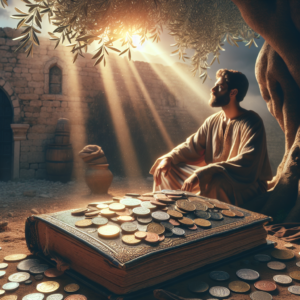Spiritual Devotional about Spiritual Ecology
Embracing Spiritual Ecology: Stewardship for a Sacred Earth
Greetings, beloved readers!
Today, let’s embark on a beautiful journey into the heart of Spiritual Ecology—an inspiring concept that intertwines our reverence for the Divine with our commitment to caring for the Earth. This sacred Earth, with its vast oceans, towering forests, and intricate ecosystems, serves as a living testament to God’s magnificent creation. How can we, as stewards of this planet, nurture and protect this gift with the love and respect it deserves?
The Divine Mandate: Stewardship in the Bible
Before we delve deeper, let us anchor our understanding in the rich soil of Biblical wisdom. In Genesis 1:26, we find God bestowing humanity with a divine responsibility: “Then God said, ‘Let us make man in our image, after our likeness. And let them have dominion over the fish of the sea and over the birds of the heavens and over the livestock and over all the earth and over every creeping thing that creeps on the earth.’” This dominion is not of exploitation, but of compassionate stewardship.
Consider also Psalm 24:1, which joyously proclaims, “The earth is the Lord’s and the fullness thereof, the world and those who dwell therein.” This verse reminds us that the Earth belongs to God. Therefore, tending to it is an act of worship and obedience.
Spiritual Ecology: Treading Lightly on Sacred Ground
Spiritual Ecology invites us to recognize the interconnectedness of all life and our role in maintaining this delicate balance. When we view the environment through a spiritual lens, we see the Earth not merely as a resource to be used, but as a sacred community to which we belong.
-
Cultivate Gratitude: One of the most profound spiritual practices we can adopt is that of gratitude. As Philippians 4:6 encourages us, “In everything, by prayer and supplication with thanksgiving, let your requests be made known to God.” When we start each day by thanking God for the beauty of creation—the warmth of the sun, the song of birds, the fragrance of flowers—we become more attuned to the responsibility of caring for this divine gift.
-
Live Simply: In a world driven by consumption, Spiritual Ecology calls us to embrace simplicity, much like Jesus did. Proverbs 15:16 reminds us, “Better is a little with the fear of the Lord than great treasure and trouble with it.” By choosing a lifestyle that prioritizes minimalism and sustainability, we honor God’s creation and reduce our ecological footprint. Each small choice, whether it’s reducing waste, conserving water, or choosing locally sourced foods, contributes to the health of our planet.
-
Engage in Stewardship Activities: James 2:17 reminds us that “Faith by itself, if it does not have works, is dead.” Active engagement in environmental stewardship is a powerful expression of our faith. Volunteer for a local clean-up day, plant trees, support wildlife conservation efforts, or advocate for policies that protect the environment. These actions are tangible ways to manifest our spiritual commitment to the Earth.
-
Teach and Inspire: Proverbs 22:6 tells us, “Train up a child in the way he should go; even when he is old he will not depart from it.” Educating others, especially the younger generation, about the principles of Spiritual Ecology ensures a legacy of environmental stewardship. Share the beauty and importance of God’s creation with your family, friends, and community. Let your passion spark a collective movement towards a more sustainable future.
A Prayer for Our Sacred Earth
Let us culminate this reflection with a heartfelt prayer:
Heavenly Father, we thank You for the gift of this beautiful Earth, a living testament to Your creativity and love. Inspire us to be diligent stewards of Your creation. Open our eyes to see the sacredness in every flower, bird, and stream. Guide our actions to reflect Your love and care for all life. May our hearts be filled with gratitude, our lives marked by simplicity, and our minds dedicated to teaching and inspiring others. We pray for the strength and wisdom to protect this precious planet for generations to come. In Jesus’ name, Amen.
Dear friends, let this vision of Spiritual Ecology inspire us to walk gently and lovingly upon this Earth, knowing that our actions echo our faith and our devotion to the Creator. Together, we can be a force for positive change, nurturing the world as God intended.
In love and stewardship,
[Your Name]
Explore and dig up answers yourself with our BGodInspired Bible Tools! Be careful – each interaction is like a new treasure hunt… you can get lost for hours 🙂
Q&A about Spiritual Ecology
Certainly! Here’s a Q&A session based on Spiritual Ecology:
Q1: What is Spiritual Ecology?
A1: Spiritual Ecology is an interdisciplinary field that recognizes the spiritual dimension as integral to ecological understanding and practices. It involves the reflection on how spiritual beliefs and values can inform and inspire sustainable and balanced relationships with the Earth. This field integrates insights from ecology, spirituality, and religious traditions to address contemporary environmental issues.
Q2: How does Spiritual Ecology differ from Environmental Science?
A2: While Environmental Science focuses primarily on the physical and biological aspects of ecosystems and relies heavily on empirical data and scientific methods, Spiritual Ecology incorporates spiritual, ethical, and emotional dimensions. It explores how humanity’s inner connection to nature influences behaviors and attitudes toward the environment, emphasizing holistic approaches to ecological problems.
Q3: Why is Spiritual Ecology important in today’s world?
A3: With the increasing challenges of climate change, loss of biodiversity, and environmental degradation, Spiritual Ecology underscores the need for a profound inner transformation alongside technological and policy solutions. It calls for a shift in consciousness that fosters a deep respect and love for the earth, seeing it not just as a resource to exploit but as a sacred entity to cherish and protect.
Q4: Can you provide an example of how a spiritual tradition contributes to ecological awareness?
A4: Many Indigenous cultures have long-standing traditions that embody principles of Spiritual Ecology. For instance, the Native American concept of "Mother Earth" emphasizes living in harmony with nature, respecting all living beings, and considering the impact of actions on future generations. These traditions often include rituals and stories that reinforce the interconnectedness of all life forms and the sacredness of the natural world.
Q5: What role can individuals play in Spiritual Ecology?
A5: Individuals can engage in Spiritual Ecology by cultivating a deeper connection with nature through practices such as meditation, mindfulness, and ritual. They can also integrate eco-spiritual principles into their daily lives, such as reducing waste, supporting sustainable practices, advocating for environmental justice, and participating in conservation efforts. Personal transformation and commitment to ecological values can inspire broader societal change.
Q6: How can communities integrate Spiritual Ecology into their activities?
A6: Communities can incorporate Spiritual Ecology by organizing events that blend environmental education with spiritual practices, such as eco-retreats, nature-based worship services, and interfaith dialogues on environmental stewardship. Community gardens, conservation projects, and sustainability initiatives can also be informed by spiritual principles, fostering a collective sense of responsibility and reverence for the Earth.
Q7: Are there any well-known figures or organizations promoting Spiritual Ecology?
A7: Several notable figures and organizations advocate for Spiritual Ecology. Joanna Macy, an environmental activist and author, promotes the concept of "The Work That Reconnects," which integrates spiritual practices with ecological activism. Organizations like the Forum on Religion and Ecology at Yale and the Center for Spiritual Ecology focus on research, education, and advocacy to highlight the intersection of spirituality and ecological well-being.
Q8: How does Spiritual Ecology address the issue of climate change?
A8: Spiritual Ecology addresses climate change by urging a fundamental shift in values and consciousness. It encourages people to see climate change not merely as a technical or economic challenge but as a moral and spiritual crisis. This perspective fosters a sense of interconnectedness, collective responsibility, and the imperative to act with compassion and urgency to protect the planet for present and future generations.
If you have more questions or need further elaboration on any aspect of Spiritual Ecology, feel free to ask!


